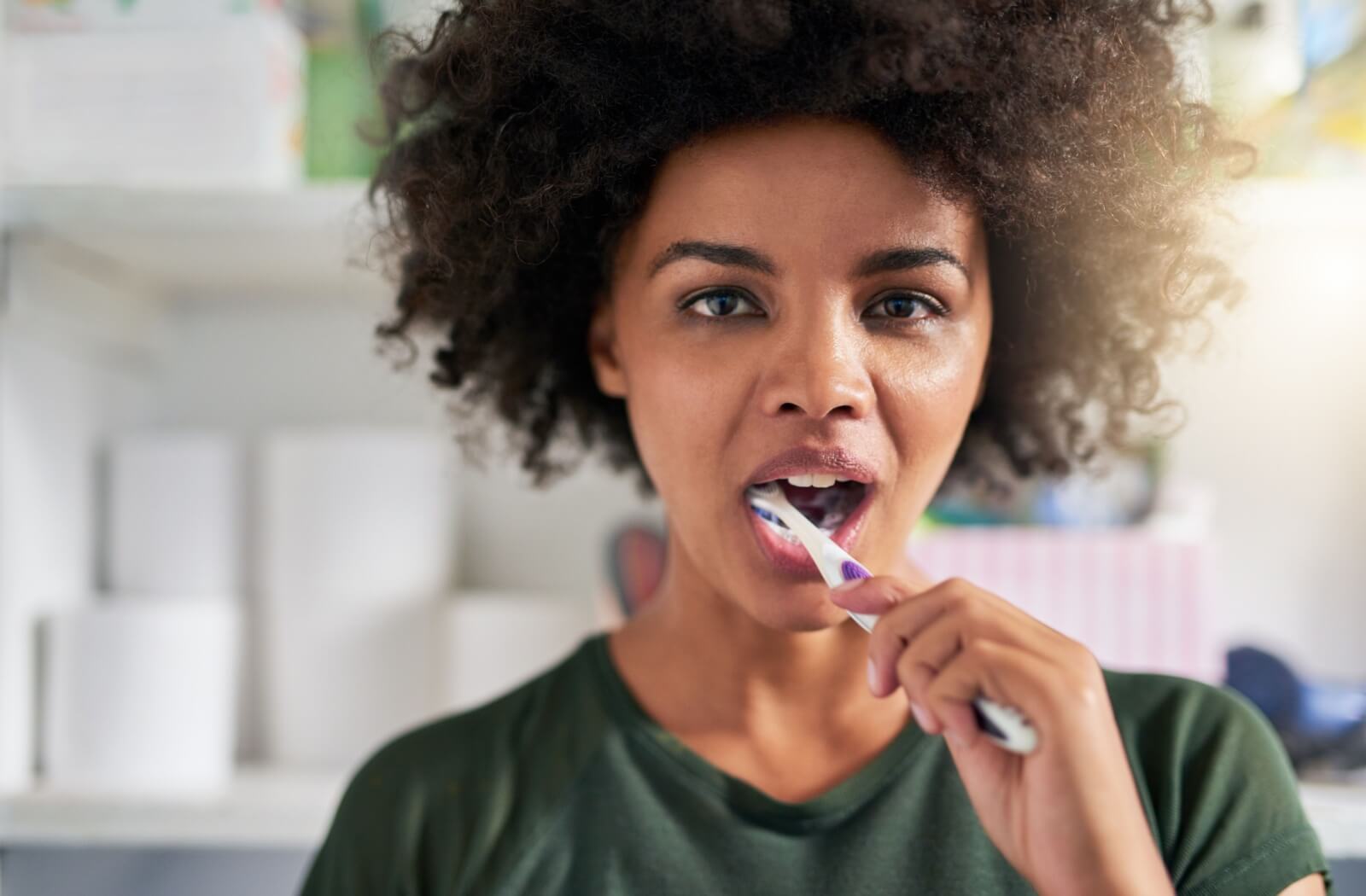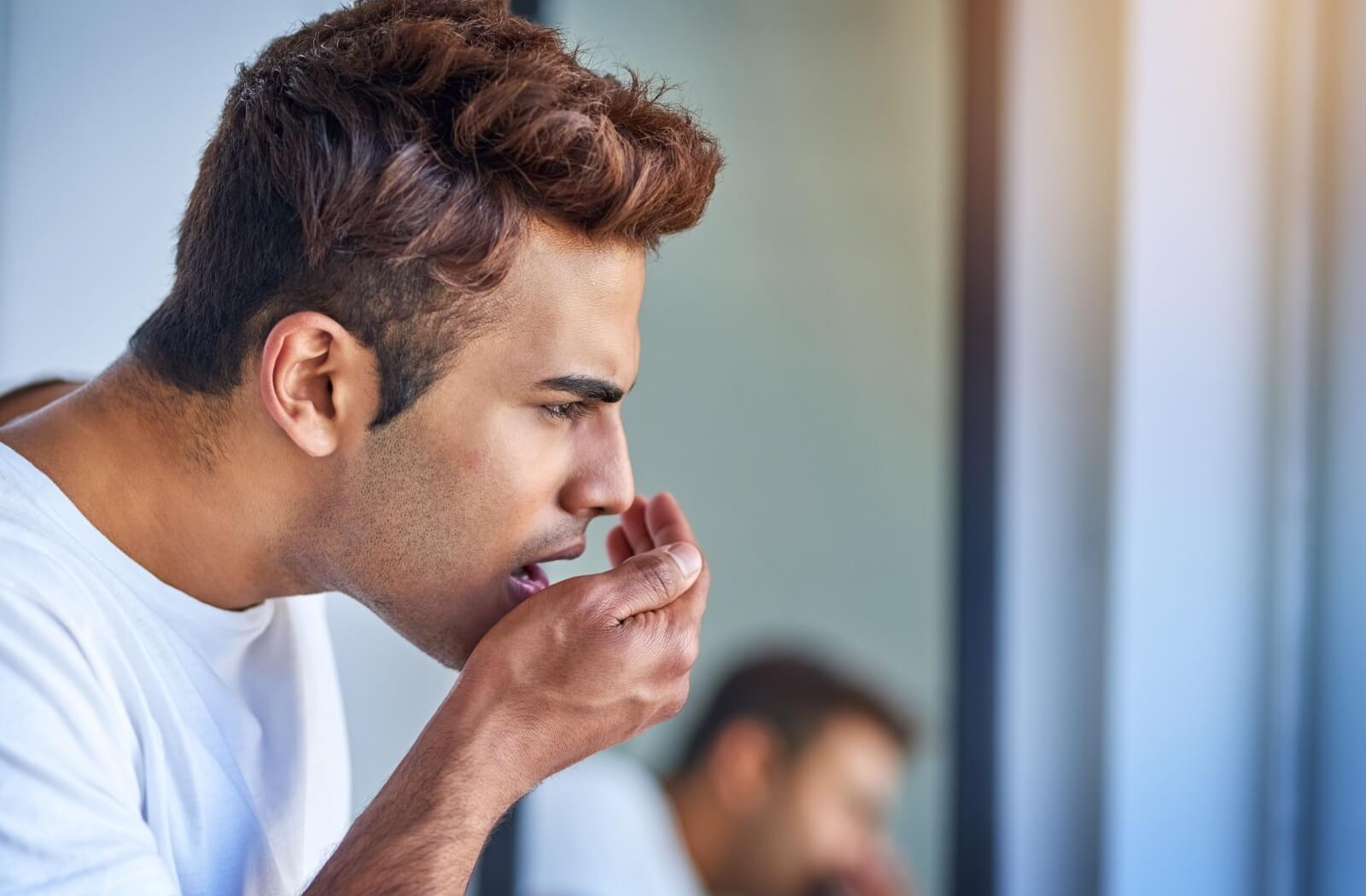Why Do I Have Bad Breath After Brushing Teeth?

Sometimes, bad breath seems to linger even after a good brushing session. You scrub and rinse, and still, that unpleasant odour persists. It can be frustrating, not to mention embarrassing.
While brushing is a vital part of oral hygiene, there are several overlooked reasons you may have bad breath after brushing, ranging from poor brushing technique to underlying medical conditions or lifestyle factors like smoking.
In many cases, there’s a simple solution to bad breath. But if you try the tips we outline in this post and still experience persistent bad breath, you should book an appointment with your dentist. They can examine your mouth and teeth and help find a solution for you.
Why Does Bad Breath Stick Around After Brushing?
Poor Brushing Technique
Sometimes, the issue isn’t that you aren’t brushing, but how you’re brushing. Using the wrong technique, insufficient time, or missing crucial areas can leave bacterial buildup in hard-to-reach spots. For example, the tongue harbours a surprising amount of bacteria, so if it’s skipped, bad breath may persist. Proper brushing technique includes:
- Brushing for at least 2 minutes, twice daily
- Using a soft-bristled toothbrush and cleaning your tongue each time you brush
Food Particles & Debris
Brushing alone may not remove all food particles and debris trapped between your teeth or along the gumline. These hidden remnants break down and release unpleasant odours. Freshen your breath by incorporating flossing into your routine to tackle those hard-to-reach areas.
Dry Mouth
A dry mouth (xerostomia) reduces saliva flow, which is crucial for washing away bacteria and food particles. If your mouth is persistently dry, especially after brushing, it could be why your breath isn’t as fresh as you’d hoped. Stay hydrated and chew sugar-free gum to stimulate saliva production.
Underlying Medical Conditions for Bad Breath
Sometimes, bad breath signals underlying health problems. If fresher breath still feels out of reach, these other factors might be worth examining.
Gum Disease & Bad Breath
Gingivitis and periodontitis are common culprits behind persistent halitosis. Gum infections caused by plaque buildup release foul-smelling bacteria as they progress, even if you brush regularly. Schedule regular dental checkups to spot signs of gum disease early.
Sinus Infections & Respiratory Issues
Post-nasal drip and mucus buildup during sinus infections can foster bacteria in the back of your throat and nasal passages. Similarly, respiratory issues like bronchitis may lead to bad breath. Seek medical advice if you suspect sinus or respiratory problems are contributing to chronic bad breath.
Gastrointestinal Problems
Sometimes, bad breath isn’t coming from your mouth at all. Gastrointestinal issues like acid reflux or other stomach ailments can cause unpleasant odours in your mouth. Speak with your doctor if you experience symptoms like heartburn alongside bad breath.

Diet & Lifestyle Factors Contributing to Bad Breath
What you eat and your daily habits also significantly affect how fresh your breath is after brushing.
Foods that Contribute to Bad Breath
Certain foods, like garlic, onions, and heavily spiced dishes, contain sulphur compounds that can linger even after brushing. Try eating breath-neutralizing foods like fresh apples or parsley after particularly pungent meals.
Smoking & Tobacco Use
Smoking does more than stain your teeth. It can cause persistent dry mouth and leave behind a smoky odour that brushing can’t easily banish. Consider quitting or reducing smoking to protect your oral health.
Alcohol Consumption
Alcohol dries out your mouth, giving bacteria a more conducive environment to thrive, leading to unpleasant odours. Drink water alongside alcohol to help maintain saliva flow.
Mouthwash & Its Role in Fresh Breath
Mouthwash can be an effective tool in your oral hygiene arsenal. It helps reduce bacteria, neutralizes odours, and leaves your mouth feeling fresh. But it’s not a miracle solution and shouldn’t replace brushing or flossing.
Choosing the Right Mouthwash for Fresh Breath
Look for an alcohol-free mouthwash with antibacterial properties. Alcohol-based mouthwashes can worsen dry mouth and promote bad breath over time.
Tips for Preventing Bad Breath After Brushing
Implementing the proper habits can amplify the results of your brushing routine.
Use Proper Brushing & Flossing Techniques
- Brush for a full 2 minutes with a fluoride toothpaste.
- Floss at least once a day to remove trapped debris.
Stay Hydrated
Dehydration exacerbates dry mouth. Drinking enough water throughout the day naturally helps flush out bacteria and food particles.
Maintain a Balanced Diet
Reduce your consumption of odorous foods and incorporate fresh, natural items like fruits and vegetables to freshen your breath naturally.
When to See a Dentist
If you’ve tried these tips and your bad breath persists, it could indicate a more serious issue that requires professional attention.
A dentist can identify and treat dental issues, such as cavities or gum infections, contributing to bad breath. They can also guide you on proper oral hygiene techniques tailored to your needs.
Freshen Your Breath & Protect Your Oral Health
You shouldn’t just “settle” for bad breath after brushing. You can achieve the fresh, healthy smile you deserve with the proper habits, professional help, and some attention to your diet and lifestyle.
If stubborn bad breath has been hanging around, why not take the next step toward a solution? Schedule an appointment with us at Generations Dental. Our experienced dentists can provide you with tailored advice on freshening your breath.